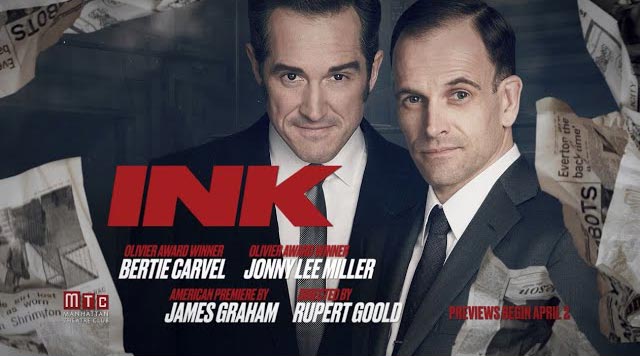By Elyse Trevers
Rupert Murdoch’s The Sun, changed the face of newspapers. Indeed, he irreparably changed the nature of the media. No longer would the newspaper be merely informative; now it would cater to the wants of the people. The recent British play “Ink” by James Graham is a riveting and eye-opening account of the Murdoch paper and the beginning of his media empire. Directed by Rupert Goold, it begins when Murdoch buys The Sun.
The play, mounted by Manhattan Theatre Club, shows Murdoch (excellent Bertie Carvel) at dinner with Larry Lamb (Jonny Lee Miller,) trying to convince Lamb to become the editor of his paper. He refers to the two of them as “The lion and the lamb.” There’s a small budget and a contractual obligation to continue the paper immediately, so Lamb won’t have enough time to get his own organization in place before the first paper is printed. Yet Murdoch is able to convince Lamb to take the position, telling him to have fun with it and do what others haven’t done. He also promises to stay out of the way but also explains that he’ll treat it like a business. There’s also a tacit understanding that Lamb is to beat the circulation of The Mirror, the premier newspaper, by the end of the first year.
Murdoch thinks of himself as an outsider and directs Lamb to use the paper to reach the little guys, the outsiders. The Sun should be their paper and reflect what they want to read. Larry now has the daunting task of enlisting a staff to work for a failing paper so he goes to several journalists he knows, offering them promotions and titles. Although they are leery, they agree and each “literally” joins in the dance.
The setting and stage design by Bunny Christie, is creative and eye-popping. The newspaper office is a series of metal office desks, haphazardly placed upon one another, almost forming a tower.
The staff begins by tossing out the traditional newspaper formats and using a flipchart, tossing ideas around, discussing what they like. They change the logo and use all caps for the headlines. As circulation begins to increase, the paper sponsors events like puppy week and giveaways. The staff creates a tabloid, highlighting and sensationalizing ordinary as well as famous people.
Yet The Mirror is still far ahead of them in circulation. Then the unthinkable happens to one of their own. The wife of Arrick McKay, Murdoch’s deputy, is kidnapped. (The kidnappers mistakenly thought that she was Murdoch’s wife.) Lamb uses the story and continues to sensationalize it.
This is the only time that Murdoch shows some sensitivity, until Lamb reminds Murdoch that he wouldn’t hesitate using the story if he didn’t know her. Circulation goes up, but it still is behind The Mirror until Lamb comes up a bold new idea. He will use a picture of a bare-breasted girl on page three. Never before had a serious paper used nudity.
As Murdoch, Carvel (Miss Trunchbull in Matilda) is crude and rough. He’s wonderful, speaking quickly and tolerating no nonsense. He stoops over slightly, reminiscent of the caricatures of Richard Nixon. Carvel, who won the Olivier for his performance in INK, in London, is the bull in the china shop determined to change the media culture
As Lamb, Miller, (familiar from TV’s Elementary) changes over the course of the almost three-hour play. He’s quite impressive in the play, more so than in the television show. He’s part of the establishment, a newsman, well-steeped in journalistic traditions. He’s quieter, more indecisive until by the end, he’s becomes almost manic, more Murdoch than Murdoch.
All the events in the INK are true and that’s why the play is so gripping. And scary. Sensationalism has become part of our world today and the play explains some of the origins. The media no longer merely reports the news; it panders, seeking to find what people want to read. It’s all over social media too — not only in INK.



